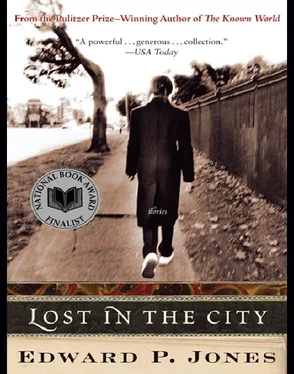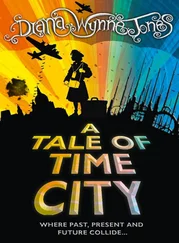“Yes.”
“We are very sorry to call at such a time, but your mother died twenty minutes ago.” The woman was waiting. “Ms. Walsh?”
“Yes. I’ll be there soon as I can,” Lydia said.
“Very well. We, the entire staff here at George Washington, are very sorry. Your mother was an exemplary patient,” the woman said. “We will expect you very soon.”
“Listen,” Lydia said. “Don’t…don’t put that sheet over her face until I get there, okay? I don’t want to walk in and see that sheet over her.”
“Very well,” the woman said. “We will expect you soon. And again, we at George Washington are very sorry.”
Lydia hung up the telephone. She continued sitting on the floor and watched the clock that could tell her the time in the dark. The minute numbers on the clock moved ahead one, two, and then three more minutes. Twenty minutes ago, what had she been dreaming? Try to remember, she told herself, for all of it must go in the diary: On the night of June 29th, I was dreaming such-and-such and such-and-such when my mother passed away. Try to remember where you were.
She tapped the base of the brass lamp once and the bulb’s lowest setting came on. The man in the bed was naked, as was she. There was a foreign smell about herself and she realized that it was his cologne, a popular and very expensive concoction that many of the men she knew wore because someone in their world had decided that the smell conveyed power and success. She thought she had been dreaming of Antibes and the naked Texan on the beach when her mother died, but the more she thought the more it seemed that Antibes had actually been on her mind when she came the first time hours ago.
What is his name? she asked herself of the sleeping man. From a nightstand drawer she took one of the three appointment books she kept in the town house. On the June 29 page there were the initials JL scrawled across all the hours after eight in the evening. She remembered they had met at Trader Vic’s for dinner after she had come from the hospital, and then they had come to her place. But what had she called him all those hours? She flipped back through the pages: “Gyn-nw dia” on the 22nd morning; “B Kaufman — Sen Fin” lunch on the 20th; “Taylor — Amer. Con Life Bst” at two on the 19th afternoon. Finally, on the evening of the 15th, she found “Dinner and?????? with Jack Lawrence, Amer. Bankers….”
“He’s pretty light-skinned, ain’t he?” her mother had said of the first boy she had ever slept with, though all her mother knew at that time was that the boy had taken her to a movie and Mile Long for a steak sandwich. “Does he come from a sickly family?” her mother had asked. She told her diary about the evening the boy busted her cherry: “The movie was Who’s Afraid of Virginia Woolf? He told me that I was the most beautiful girl at Dunbar, but when he walked me back home after the ‘dirty deed’ was done, he acted like he didn’t know me anymore.”
She shook Jack Lawrence from Amer. Bankers, who was not light-skinned but the color of dark honey. He grabbed her hand and squeezed it so hard she thought she heard her bones cracking — in his sleep he had perceived some threat to himself. She screamed and he woke up, his hand still holding hers and his head turning about to find out where in the world he was. He released her and she rubbed her hand. “What the hell’s wrong with you?” she said.
“Sorry…sorry,” he said. “I must have been dreaming.” The way he said “dreaming” prompted more details about him: Something he called fate had plucked him from the streets of Harlem and sent him to Horace Mann prep, then sent him to Dartmouth, then sent him to Harvard Law. At their first dinner, he had said of the place where she had gone, “I would have gone to Yale Law, but there was something I didn’t like about the white guy that interviewed me.” “You okay?” he said now. He was still lying down.
“I’ll be all right. I have to go,” Lydia said. “My mother has died and I have to go to her.”
“Oh, Cynthia, I’m very sorry.”
My name is Cynthia and I come from Washington, she chanted in her head. What was that from? Jumping rope or playing hopscotch? He does not even know my name on the very night my mother has died, she thought, wanting him out of her bed and out of her house. “You can get some sleep,” she said. “Make sure the door is locked when you leave.”
He yawned. “Yeah, I’m beat,” he said. The way he said “beat” brought more details about him. He turned over and pulled the sheet up to his shoulders. Even now, she thought that they were nice shoulders.
“I can’t believe I’m walkin the same paths that my Lord walked,” her mother had said that second day in Israel, standing at the Church of Gethsemane. Lydia had presented the trip to her mother on her sixty-fifth birthday and had even paid the way for Georgia Evans, her mother’s best friend. Lydia had not wanted to go, but her mother had insisted. “Oh, Lydia,” her mother had said, “what would the Holy Land mean to me without you bein there with me?”
Georgia, lazy, far less religious that her mother, had complained about all the hills. “How did Jesus get any preachin done goin up and down these hills?” she said the second day. Georgia would drink all the water she carried, then want more from Lydia and her mother. “I never done so much walkin in all my life. Never drunk so much water either.” On the third day, after the Via Dolorosa, Georgia was unable to go on and spent the next days moping about the hotel. “I never thought all I’d get to see of the Holy Land was a big old hotel. Must be a sin in that somewhere.”
My mother lies moldering…
She tapped the base of the lamp three times and the bulb went through the rest of the settings, then the room went dark. In the living room, she knew she needed some coke. One line, she said to herself, one line and no more. This fur and no further. With the gold razor blade, she spread out the cocaine on the black marble tray, then inhaled a line of two inches or so through the crystal straw Gail Saunders had brought back from Bonn. “I hereby make this oath, this pledge, this whatever,” Gail said the night of her return. “I’ll sleep with no more white men. They make you feel like you should be grateful.”
In the shower, Lydia held her face as close as she could to the nozzle. After she had finished, she soaped herself again. “Best get his smell off me,” she said to the water. “Or else when I walk in there, they’ll know I’ve been fucking. The nurses and doctors will look at me and they’ll say, ‘Why, Ms. Walsh, your mother lies moldering and you’ve been fucking.’”
“Forgive me, Father, for I have been fucking,” she said to the mirror as she toweled off. The exhaust fan made a low humming sound, barely audible even in the quiet of the night. But though the repair people had been there four times, it was still too loud for her. “No sound,” she had said to the second repairman. “Absolutely no sound whatsoever. Can you manage that?” She did not want to go back to her bedroom, to her closet, so she dressed in the clothes she had returned home in the evening before. They, the clothes, were scattered about the living room, where Amer. Bankers had taken her the first time and where Antibes had entered her head. That first Sunday in Antibes, she had done as the natives did and gone naked on the beach, and a stranger, the naked Texan reading Ayn Rand, had said in the most exquisite French that her breasts were perfect. Je m’appelle Lydia et j’babite a Washington .
She called a Capitol cab, because that was the company her mother had always used. “Trust Capitol to get you there and back in one piece,” her mother had said. “Don’t trust D.C. National or Empire.” Lydia opened the front door and listened to the night sounds. She felt the coke was wearing off. Way off to the left, through the thick leaves of June, she thought she saw the sun inching up, but she knew how deceptive the light in Washington could be. Once, as a girl, she had traveled with her mother’s church through most of the night to an edge-of-the-world mountain town in Virginia, where the church members had held Easter sunrise services as the sun came up over the mountains. “We proclaim,” the preacher had said, “that Jesus has risen.” “We proclaim it so,” the congregation had said, huddled in blankets and covered with dew. “We proclaim it so.”
Читать дальше












